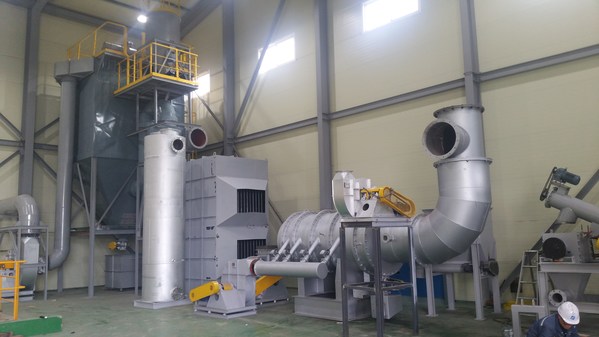– Secured CSC waste treatment technology from Kinava to handle the increased waste volume of the COVID 19 era.
SEOUL, South Korea, May 28, 2021 /PRNewswire/ — Global environment company Kinava has developed a commercial plant for treating organic waste with a combined circulation that can treat even the non-combustible waste. It contains a large amount of moisture, removes air pollutants discharged to the outside through the efficiency of low-calorie organic waste resources and the environmental pollution prevention system. The plant can minimize toxins such as SOx, NOx, and other gas through continuous discharge of airborne dust accumulated in the bottom of the furnace.

Secured CSC waste treatment technology from Kinava to handle the increased waste volume of the COVID 19 era.
The World Bank’s ‘What a Waste 2.0’ report estimated the solid waste production worldwide will be 3.44 billion tons by 2050 while it was 2 billion tons in 2016. The annual waste production rate would increase by at least 33% every year.
Waste treatment issue is an inevitable byproduct of the rapid urbanization, economic and population growth. The increased time at home, delivery of food with plastic packaging, and masks of Covid-19 also contributed to the increase of waste; one study estimated that 12.9 million masks are thrown away monthly worldwide.
Residents in Tennessee, Pennsylvania, including New York with 10,000 ton of daily waste volume, are left to deal with the wastes alone. The city government of New York has introduced a food waste recycling program since 2016 as garden and food wastes that can be used for fertilizers take up a third of the waste production; however, its budget decreased to 24 million dollars since Covid-19.
The world’s waste treatment industry is likely to expand to 530 billion dollars (KRW 645 trillion) by 2025, from its 330 billion dollar (KRW 401 trillion) in 2017, with annual growth rate of minimum 6%. In the United States, many plants are in operation due to the commercialization of solid fuel manufacturing technology and combustion technology for organic waste resources such as food and wood waste; it’s focusing on bio-gas and production of electricity and steam with large-scale combustion systems.
For more information, please visit Kinava’s website.(www.kinava.com)
Related Links :
http://www.kinava.com/
Donate To The Indian Sun
Dear Reader,The Indian Sun is an independent organisation committed to community journalism. We have, through the years, been able to reach a wide audience especially with the growth of social media, where we also have a strong presence. With platforms such as YouTube videos, we have been able to engage in different forms of storytelling. However, the past few years, like many media organisations around the world, it has not been an easy path. We have a greater challenge. We believe community journalism is very important for a multicultural country like Australia. We’re not able to do everything, but we aim for some of the most interesting stories and journalism of quality. We call upon readers like you to support us and make any contribution. Do make a DONATION NOW so we can continue with the volume and quality journalism that we are able to practice.
Thank you for your support.
Best wishes,
Team The Indian Sun












